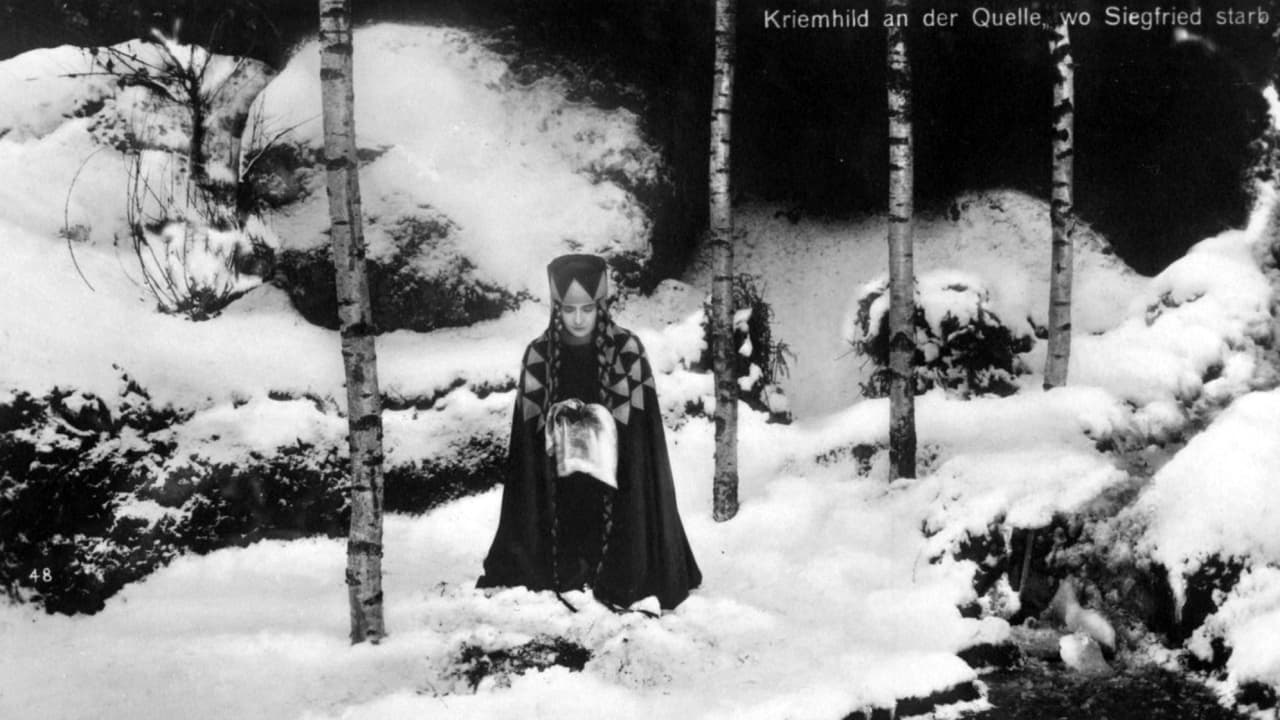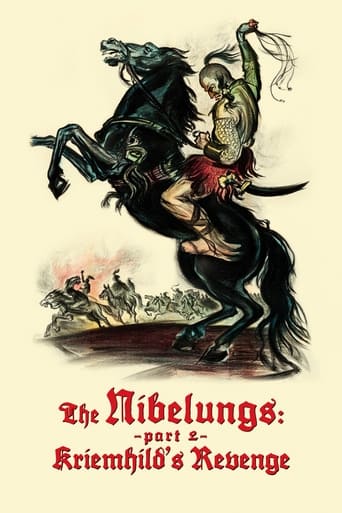

This film portrays revenge on an operatic scale. But do not confuse with Wagner's opera Das Ring des Nibelungen. Although both the film and Wagner's opera are based on related Norse and Icelandic sagas, Wagner devotes attention to Brünnhilde's reaction to the death of Siegfried rather than on Siegfried's widow Gutrune's (i.e. Kriemhilde's) reaction to the murder of the hero. Both the film and the opera are romantic in style. But unlike the 19th century opera, the film has elements of early 20th-century German expressionism. Everything about this film is perfect. The acting is over the top, as it needs to be. The sets are sublime. The crowd scenes are powerful. Imagine a film where the heroine makes Attlla the Hun (Etzel) seem like a reasonable, sympathetic host.
... View MoreCanto 1: How Kriemhild Mourned Over Siegfried and How King Attila Woos her Through his Ambassador Rüdiger von Bechlarn: Kriemhild (Margarete Schön) insists on having the head of the killer of her beloved husband, Hagen Tronje (Hans Adalbert Schlettow), but her brother, King Gunther (Theodor Loos), refuses her request. When King Attila of the Huns woos Kriemhild through his ambassador Rüdiger von Bechlar, she makes him promise through oath in the name of his king that no man would ever offend her. Hagen Tronje hides the Nibelungen treasure in the bottom of a lake.Canto 2: How Kriemhild Takes Leave from her Homeland and How She Was Received by King Attila: Kriemhild brings some earth from where Siegfried died, and travels to the court of the Huns, where she is welcomed by Attila himself, who also promises through oath to defend her.Canto 3: How King Attila Besieged Rome and How Kriemhild Summoned her Brothers: When Kriemhild delivers a baby boy, Attila returns to his realm and asks Kriemhild what she would like most to please her. She asks him to invite her brothers to come to his kingdom.Canto 4: How Kriemhild Receives her Brothers: Kriemhild insists on having the head of Hagen Tronje, but her brothers keep loyalty to their friend and again do not accept her request.Canto 5: How the Huns Celebrated the Summer Solstice With the Nibelungen: Kriemhild asks Attila to kill Hagen Tronje, but he refuses since in accordance with the laws of the desert, a guest is considered sacred. Kriemhild offers gold to the Hums for the head of Hagen Tronje. There is a fight, and Hagen Tronje kills Attila's son.Canto 6: The Nibelungen's Distress: The Huns lose the battle against the Nibelungen, but keep them under siege inside Attila's castle. Kriemhild promises to spare their lives provided they deliver Hagen Tronje, but her brother Gunther tells that German people are loyal with their friends.Canto 7: The Nibelungen's End: After the death of Rüdiger von Bechlarn, Giselher and Gernot, Hagen Tronje and Guhther are finally captured. Kriemhild kills Hagen Tronje, ending her revenge with the destruction of the Nibelungen.The conclusion of the poetic saga of Siegfried through "Kriemhild's Revenge" is also told through seven dramatic cantos. The nature of the first part is a magnificent tale of fantasy, adventure, romance and betrayal; the second part is a dramatic story of hate, revenge and loyalty. The solid screenplay with a perfect development of the characters, the excellent performances of the cast and the awesome direction of Fritz Lang produced another epic ahead of time. Margarete Schön is impressive with a total different woman, obsessed and inflexible in her revenge wish. The costumes that Kriemhild wears are also very impressive, and her acting is based on her face and look. I was a little disappointed with the reaction of Attila after the death of his only son, since I found it too passive. My vote is eight.Title (Brazil): "Os Nibelungos Parte II: A Vingança de Kriemshild" ("The Nibelungen Part II: Kriemhild's Revenge")
... View MoreAnyone who's seen the first instalment of Die Nibelungen (which should be anyone who's viewing this) will know exactly what to expect. Kriemhild's Revenge is the story of the vengeance for Siegfried's death by his wife, Kriemhild. One again, the genius Fritz Lang dazzles his audience with the larger than life plot and visuals, and the second instalment of the series is an epic in every sense of the word. On a personal note, I've got to say that this pair of films didn't do a great deal for me, other than educate in the history of cinema. The scene staging is fantastic, and the way that Lang makes every event a big thing ensures that the film has a real epic feel. The use of music is one of the film's strongest elements, as Gottfried Huppertz's score bodes well with the rest of the movie. This instalment is less frantic than the first, and that discredits it a little as the film isn't easy viewing anyway; and more scenes such as the one that saw the hero fighting a dragon in the first film wouldn't have gone amiss. But even so, this is a great story directed by a cinematic genius and this film is bound to appeal to people who like classic silent films more than I do.
... View MoreGreat battle finale and nice sets help keep this often-slow movie enjoyable. At times it had me checking my watch, although there were enough memorable moments to make the film stand out in my mind days after watching it. The ending should surprise even those familiar with the Nibelungen story line.
... View More